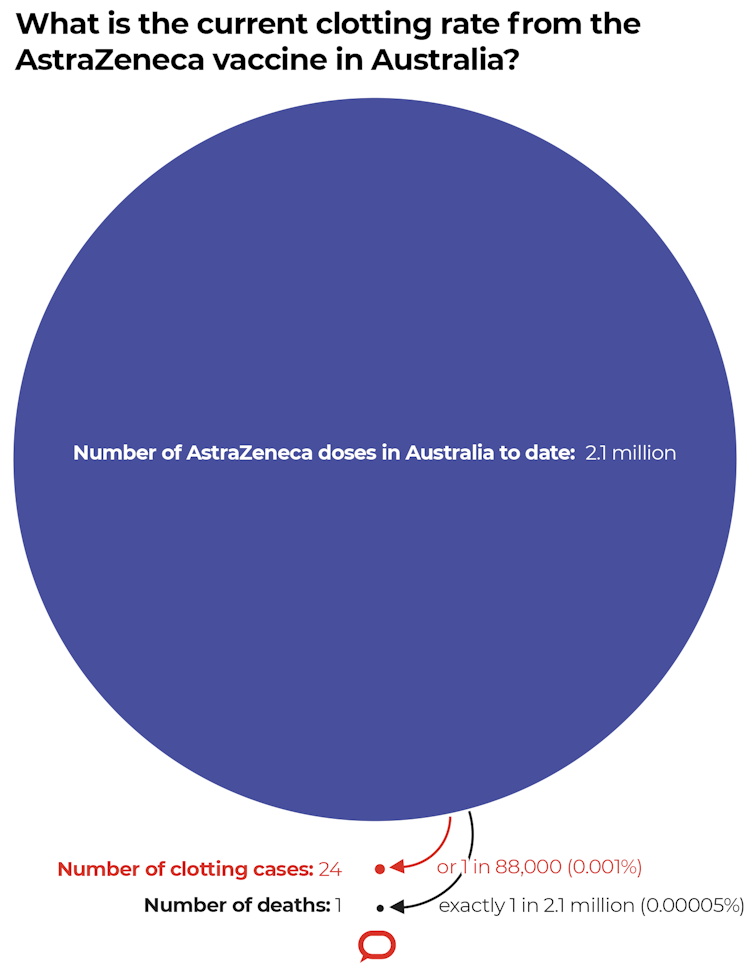How rare are blood clots after the AstraZeneca vaccine? What should you look out for? And how are they treated?
With COVID-19 community transmission happening the climb up once again, those aged over 50 are weighing up the benefits of being vaccinated against the computer virus with the precise rare risk of blood clotting induced by the AstraZeneca vaccinum.
Since the first reports of blood coagulation after the AstraZeneca vaccine emerged in March 2021, our understanding of the clotting disorder, called vaccine-induced thrombotic thrombocytopaenia (VITT) surgery thrombosis with thrombocytopenia syndrome (TTS), has grown.
We now love how to diagnose and treat it, so we'rhenium likely to visualise better outcomes for patients with the condition.
How common and deadly is information technology?
Thankfully, developing blood clots after the AstraZeneca vaccine is very extraordinary.
Then far in Australia, out of 2.1 million doses of the AstraZeneca vaccine, 24 cases of TTS have been reported. And then the risk of TTS is approximately one in 88,000.
These figures are similar to those reported in the UK, Common Market, the Middle East and Canada.
Although early reports from Common Market indicated approximately 20% of cases of TTS were fatal, in Australia, to date, one out of 24 TTS cases has been fatal, so equitable ended 4%.

What exactly is thrombosis with thrombocytopenia syndrome?
Although we don't as yet have the full account, it appears that the AstraZeneca vaccine can trigger platelets, which are small cells in our rakehell important for forming blood clots that prevent bleeding.
In some people, activated platelets can bring out a protein known as platelet factor 4 (PF4), which binds to the AstraZeneca vaccinum. It is persuasion that this cover of PF4 bathroom induct the immune system to activate more platelets, making them reefer collectively and thereby decreasing their numbers pool. This leads to blood coagulation (thrombosis) and a low platelet count (thrombocytopaenia).
Having blood clots with a reduced number of platelets is a key feature of TTS.
Different to other blood clots
This mechanism is quite opposite to the common process past which blood clots take plac.
TTS appears to effect from an irregular immune response, so current evidence suggests masses with a history of heart attack, stroke, deep vein thrombosis, pulmonary embolism (a clot in the lung) or happening regular blood thinners aren't at any multiplied risk of TTS.
However, As a precautionary measure, the Pfizer vaccine is currently recommended for people aged low 50 years, Oregon those with a history of clots in the psyche, in the belly or previous low platelet count subsequently taking the blood-thinning drug Liquaemin.
Testing and treatment has improved
A key development is designation tests and guidelines to recognise and treat cases of TTS. In most cases, patients will suffer a low blood platelet count, show of a blood clot, and antibodies orientated against PF4. Many of these tests can follow done promptly.
Treatment can now begin instantly, with specific stoc thinners and medications to dampen the immune system.
As of May 20 when the latest vaccinum safety report was free, 21 of the 24 Australians with TTS had found and been discharged from infirmary and deuce were stable and recovering in hospital.
So what side effects are normal, and what might indicate a clabber?
Miscellaneous side personal effects are unwashed after whatsoever vaccine. In the case of the AstraZeneca vaccine, these happen in the first two years afterwards vaccination and include:
- headache
- febricity (chills)
- muscle and joint aches
- nausea
- fatigue
- pain at the locate of injection, which tends to resolve with lancelike measures so much every bit paracetamol.
In numerous cases, the blood clots in TTS occur in unusual locations such as the veins in the abdominal cavity (splanchnic vein thrombosis) and head (cerebral venous fistula thrombosis). They typically occur 4-30 days years after vaccination.
Therefore, symptoms that could indicate TTS afterwards getting the AstraZeneca vaccine include:
- persistent or strong vexation
- blurred or ambiguous vision
- shortness of breath
- severe abdominal, back or thorax pain
- swelling, redness, pain in a leg
- unusual bleeding or bruising.
If you experience any of these symptoms 4-30 days after your inoculation, seek urgent medical tending.
Reconciliation the risk and benefits
While TTS is selfsame rarefied, some the great unwashe will have concerns and will want to discuss them with their doctor. This is essential to countenance mass to make an informed alternative.
However, with the ongoing risk of exposure of COVID outbreaks in Australia and their potential insanely consequences, as well as the possibly severe long-terminal figure effects of COVID-19, for the vast majority of people, the benefits of vaccination against COVID-19 as soon arsenic practicable outweigh the risks.![]()
Karlheinz Peter, Lab Direct, Atherothrombosis and Tube-shaped structure Biology and Deputy Director, Baker Sum and Diabetes Establish; Interventional Heart surgeon, Alfred the Great Hospital; Professor of Medicine and Immunology, Monash University, Baker Heart and Diabetes Institute and James McFadyen, Research Chap, Baker Heart and Diabetes Institute, Haematologist, Alfred Hospital, Bread maker Essence and Diabetes Institute
This article is republished from The Conversation under a Notional Commons license. Record the original article.
Source: https://hellocare.com.au/how-rare-are-blood-clots-after-the-astrazeneca-vaccine-what-should-you-look-out-for-and-how-are-they-treated/
0 Response to "How rare are blood clots after the AstraZeneca vaccine? What should you look out for? And how are they treated?"
Post a Comment